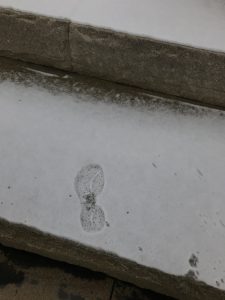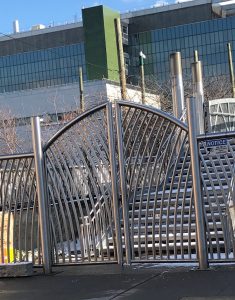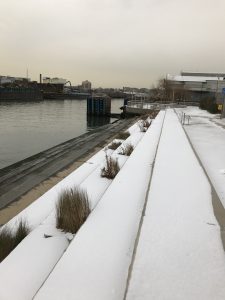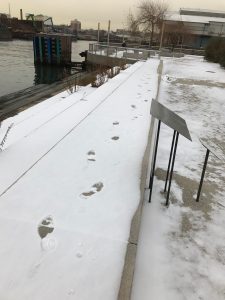I’ve been thinking about transition: how one thing becomes something new. I brought my questions to post-Nature on two cold mid-December days.
On the 14th, the Nature Walk was closed, because the city crews had not yet cleared the steps. I took a picture of the locked gate, behind which you can catch the glint of snow amid industry.
On the 15th, after collecting the last of my fall exams, I ran into a crew clearing the steps. “We’re open every day,” the guy said, “Except I guess not yesterday.”
I rushed out to the Creek, eager to put my questions to the cold water.
I’ve been thinking about the old problem of revolution: what if reforming a corrupt system actually props up that system and thereby defers needed change? Remember the old pre-Soviet revolutionary slogan, “The worse, the better“? Do we need gradual change or should we (in a phrase variously attributed to Marx, Rosa Luxemborg, and Lenin), heighten the contradictions?
In recent conversations, I’ve been thinking about the need for change in environmental policies, academic publishing, and US politics. Just to name a few things that need change for the better!
What wise words does the silent Creek speak about transition? What’s changing, in and under and near that toxic water?
I don’t look like much of a revolutionary, in my cozy suburban house with dogs & kids & tenure. But I know things are changing and must change. I know that change, even desired change, often comes abruptly and painfully. Responding to change is, it seems to me, the most difficult and essential thing humans do. It turns out that a lifetime of thinking with Shakespeare does teach something!
When I reached the Creek I saw no footprints on the inch of cold snow. It was low tide, with three muddy but dry steps visible below the snow line. I was the first to walk on that whiteness, after the storm the day before.
“How does change taste?” I whispered to the waters. “What smells like transition?”
I wanted the darkness beneath the surface to answer, but it did not.




Leave a Reply